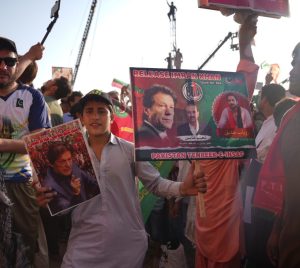The Pakistan Tehreek-e-Insaf (PTI) rally in Islamabad on Sunday has created a new round of controversy in Pakistan, sparking fears that political tensions in the country are set to explode.
At the rally, PTI leaders warned the government that they would free party chief and former Prime Minister Imran Khan if he wasn’t legally released from prison within two weeks. The party has also warned of serious consequences if the cases against Khan are taken to military courts.
Khan has been in prison since 2023 after being sentenced in a corruption case. Concerns are growing that he could be tried in military courts for his alleged involvement in inciting violent attacks on military installations on May 9 last year. In this regard, the ongoing military trial involving former spy chief Lt. Gen. Faiz Hameed has added another layer of complexity to the country’s political landscape.
The PTI claims that all cases against Khan are politically motivated and unfounded.
Khyber Pakhtunkhwa Chief Minister Ali Amin Gandapur remarked at the rally that even the military establishment could not prevent him from freeing Imran Khan. Addressing the Shehbaz Sharif government, he said, “Keep your house in order, otherwise we will keep the military in order.”
The rally seems to have created more legal and political problems for the party leadership. Officials allege that by criticizing state institutions and clashing with security forces, the PTI has violated the terms under which it was permitted to hold the rally.
After the rally ended, Islamabad police arrested several PTI lawmakers from parliament premises in new cases. Gandapur was taken to an intelligence agency’s office in Islamabad shortly after he made provocative comments about the military leadership. The Khyber Pakhtunkhwa chief minister reportedly spent hours in captivity without any contact with other PTI leaders or his staff. This suggests that the military establishment is unfazed by the PTI’s criticism and is prepared to intensify tensions should Khan persist with his confrontationist approach.
The Islamabad rally was the PTI’s first major event outside Khyber Pakhtunkhwa province since the general elections in February this year. The PTI could have used the rally as an opportunity to make a case for reconciliation with other political parties and the security establishment. Instead, the party chose to escalate hostilities.
Despite being given permission for the rally, the PTI leadership decided to intensify their attacks on both the civilian government and the military leadership. This surprising development can be largely attributed to internal pressures within the PTI itself.
Most of the party’s politically active leaders are from Khyber Pakhtunkhwa province. They appear to be heeding Khan’s calls for increased assertiveness and boldness to challenge and put pressure on the current civil-military regime.
However, this approach seems to have led to missteps that have left many questioning the party’s strategic direction.
While the Khyber Pakhtunkhwa-based PTI leadership remains vocal, there is a stark absence of action or presence from PTI leaders in Punjab, Sindh, and Balochistan, raising concerns about the party’s ability to mobilize street power beyond its stronghold in Khyber Pakhtunkhwa.
The question now arises: Can this confrontational approach yield any tangible results for the PTI as it faces threats on multiple fronts?
Despite the party’s popularity, sustaining pressure and political momentum against entrenched military power is difficult.
The ongoing tensions between powerful actors in Pakistan are not only detrimental to the PTI; the political volatility sends troubling signals to the international community at a time when Pakistan desperately needs external support to stabilize its economy.
Pakistan is on the verge of a potential showdown between a popular political party and a powerful military. Will the unfolding political situation bolster or undermine the parties involved?

































